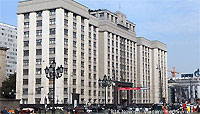Duma to Consider Science Reform Amid Protest

(Moscow Times – themoscowtimes.com – Natalya Krainova – September 18, 2013) The State Duma on Wednesday is set to review a controversial reform of the Russian Academy of Sciences in a key second reading amid a flurry of scandalous accusations against both the academy’s leadership and federal lawmakers who’ve sponsored the reform.
The proposed reform has been met with major criticism, as it would take away the academy’s right to manage its property, which, in turn, would deprive academics of an important source of income amid poor state financing.
Complicating matters further, accusations of embezzlement and abuse of power were recently made against the academy’s leadership, followed by accusations by members of the academy that federal lawmakers had plagiarized their dissertations.
About 1,500 protesters gathered outside the State Duma on Tuesday in an unauthorized demonstration against the proposed reform. Many held carnations said to mourn the death of Russian science, while squads of riot police lurked nearby urging the crowd to disperse. No one was detained, however.
In parallel to the protest and the Duma’s second reading of the bill, Yury Osipov, the academy’s president from 1991 to 2013, called a news conference together with Alexander Nekilpelov, his former deputy, and Robert Nigmatulin, a current member of the academy’s presidium, to fight back against accusations that certain academy members had abused their power and embezzled dozens of thousands of dollars.
The accusations were voiced on Sept. 7 in a 50-minute documentary-style film titled “Diagnostics of RAN,” broadcast by the private Ren TV television channel, which boasts an audience of 120 million people and is owned by a Kremlin-friendly businessman.
Similar accusations were made the same day on state-run Rossia One on the Vesti news program, which ran a six-minute report titled “Real Estate of RAN: Golden Meters Without Ties to Science.”
The report said that the academy “owns numerous expensive and prestigious properties in Moscow that bring in impressive revenues,” and asked who “the ‘shadowy king’ that rules” all the property was.
Televised accusations were followed by an Interfax report last Friday, in which a “source familiar with the situation” said that the Prosecutor General’s Office had “detected serious violations” at the academy, particularly the “embezzlement of state property and budget funds worth millions of rubles,” or dozens of thousands of dollars.
The news conference held by the academy’s leadership was timed to coincide with the third reading of the academy’s reform, which was initially set for Tuesday before the bill was returned for the second reading. At the conference, the speakers accused authorities of waging an information war against the academy in order to justify the reform.
Osipov called the accusations in the mass media a “large-scale campaign against the academy carried out in time for the second reading of the bill” and aimed at “convincing the public that the academy is rotting.”
Nigmatulin, a member of the academy’s presidium, told the 18 journalists and six television crews present that the academy was “the world’s most effective scientific institution,” citing his correspondence with foreign scientists as testimonial.
As for the true motives behind the academy’s reform, he said, “Somebody wants to boost their power, others are interested in getting revenge, while still others want to play with the [academy’s] property and financial flows.”
Osipov, Nigmatulin and Nekipelov all refuted the accusations against the academy voiced on Ren TV and provided arguments against each of the claims, including the alleged fraud involving the academy’s apartments, land plots, hotels and other property, as well as accusations of authoritarian leadership and physical attacks on critics.
And in a possible tit-for-tat against lawmakers behind the proposed reform, certain members of the academy demanded the dismissal of a number of State Duma deputies in an open letter published Saturday, accusing them of plagiarizing their dissertations.
When asked by a reporter whether the plagiarism accusations against lawmakers were “the scientific community’s attempt to put pressure” on them for the second reading of the academy’s reform, Nigmatulin said with a grin, “Naturally.”
“They are attacking us,” Nigmatulin said.
No official statement about the probe into the academy’s financial activities has been published.
The Ren TV film about the academy was reminiscent of similar exposes aired within the past year on state-run channels NTV and Rossia One. Those films focused on Russia’s political opposition, the imprisoned anti-government punk band Pussy Riot, the now defunct independent elections watchdog Golos and human rights activists.
Previous exposes were followed or preceded by law enforcement probes against the main characters of the films, and the development of the academy’s case mirrored the fate of the other government critics who were besmirched on state television and ended up facing charges.
